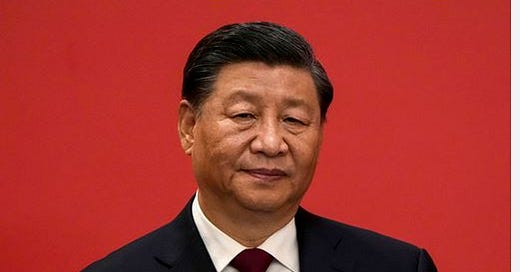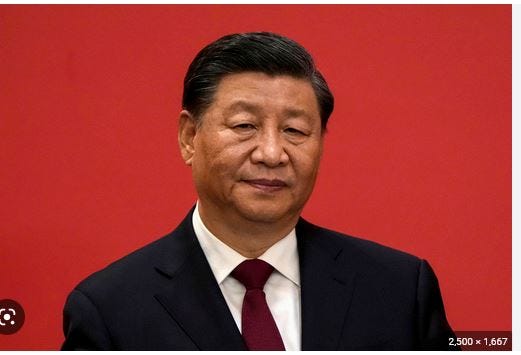In today’s Financial Times Ruchir Sharma has a very nice article about the recent readjustments in China’s policies: discontinuation of zero-covid restrictions, stronger support for globalization, and a nod toward the private sector. As the title (“The Xi nobody saw coming”) says, Sharma sees them as a sudden and unexpected volte-face of Xi. Instead of going down the Maoist path as the Western mainstream media and majority of the academics have been predicting during the past several years, Xi has decided to suddenly change course.
I liked Sharma’s article, but his main hypothesis is, I think, wrong. There is no sudden turn-around or change. This is still the same Xi, and the policy is one of “readjustment” or “rectification”.
To understand how intelligent politicians (and I think Xi belongs to that category) operate in the countries of political capitalism, one needs to start with two cardinal principles of governance: tactical flexibility, and the “bird in a cage”. The first term goes back to Lenin. Its meaning is clear. Policies ought to be flexible, in a tactical sense, while never losing sight of an ultimate vision. In Xi’s case, this ultimate vision is “socialism with Chinese characteristics”, “moderately prosperous society” and “common prosperity.” The second term goes back to Chen Yun (the father of China’s First Five-year plan). If the private sector is controlled too tightly, it will, like an imprisoned bird, suffocate. And the people will suffer. But if is left entirely free, it will fly away, bringing (as it did in the second term of Hu Jintao’s rule) all the negative effects of capitalism: increased inequality, lack of social mobility, monopolies, rule of moneyed elites, corruption etc. Thus, a smart politician needs permanently to maintain the middle line. But maintaining the middle line, in a strategic sense, is possible only by favoring alternatively pro-leftist and pro-rightist policies.
With the situation that Xi inherited in 2012, the only way forward was to move against pervasive corruption by arresting those engaged in grand embezzlement and sale of favors, to try to lessen economic inequality through state transfers and more recently the relaxation of the hukou system, and to reduce locational inequality of opportunities by implementing an ambitious policy of investments in Western provinces. Further, after covid slowed things down, to “correct” the power of the very loosely regulated financial and non-financial giants (like Alibaba).
These corrective measures were, perhaps because they were also accompanied by Xi’s cult of personality, interpreted as steps toward a new Maoism. But they were never that: they were tactical movements necessitated by the desire to keep the achievement of the strategic objective in mind.
This policy is not markedly different from Deng’s. Although Sharma explicitly mentions Deng as the architect of China’s liberalization and its stable policies, it is forgotten that Deng’s policies were “tactically flexible”, both when he came back to having some measure of power in the last years of Mao (before being “purged” again), and most obviously during and after the Tiananmen events. The Tiananmen crackdown—decided by Deng—led to the strong leftward lurch in economic policy. Thus it was not just a political, but also economic policy, shock. Yet, after three years of “leftist policies”, Deng through his Southern Tour inaugurated the reintroduction of “pro-rightist” policies. To an unsophisticated observer, these appear as sudden policy shifts; they seem as movements that presage further policy changes in the same direction. But they are not: they are tactical “rectifications”. And such policies in one direction will, necessarily, be followed after several years by policies in the opposite direction.
When the Air France plane crashed in the Atlantic in 2009, the inquiry revealed that the main cause of the crash was inability of the crew, when the plane was losing altitude, to perform a complicated maneuver, where in order to regain altitude, the plane needed first to dive down. The same holds for economic policy makers in state capitalist societies. In order to make the economy “harmoniously” grow in the long term, they have to accept short-term slow-downs and policy changes. To simple observers, they look like zig-zags; to the perceptive eye, they look like a straight line.




The FT's China coverage is simultaneously simplistic and thematically consistent, and when readers read the same projections/insinuations, its hard to pop the bubble. Interesting reference to the 09 crash!
An excellent comment. Unique ability to put communist policies into perspective, understand their real life, logical, historical, cultural, economic i.e. Leninist foundation.
Xi is a normal politician, communism is alive. New Cold War is logical. Decoupling might not work perfectly, exactly as expected by the US, because both sides in the new Decoupling War are capitalist. More like Chinese Leninist global capitalism against US liberal global capitalism.
A time may come when Communist Party of China will realize its economic and development goals. Will it be a time to give up ruling billion people in order to guide them to a post that is unachievable by any other method, and having confidence in letting China be ruled by a more spontaneous, democratic structure.
No. Letting go of communism before US is contained as global Empire would be dangerous.
As proven by Gorbachev. And Russia.